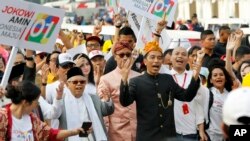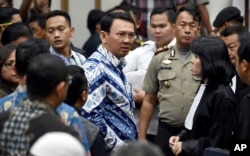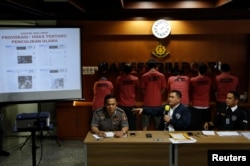As the third largest democracy in the world with a young, mobile-first population and low levels of digital literacy, Indonesia is highly susceptible to the spread of fake news and hoaxes. Government and media-led initiatives have sought to combat fake news, however with much of the misinformation spread via social media and WhatsApp, many fear the problem will only get worse in the lead up to national elections in April 2019.
“Indonesia’s media landscape is quite diverse and there is enormous press freedom in the country compared to others in the region,” says Ross Tapsell, a media lecturer at the Australian National University’s College of Asia and the Pacific. “However, it’s increasingly manipulated and influenced by media owners who are linked to political parties … push[ing] out a more partisan version of political news.”
Low literacy, partisan media
Revolusi Reza, who is commonly known as Revo, is the secretary general of the Alliance of Independent Journalists (AJI) Indonesia. “Literacy among the public, the community, is very low,” he told VOA, noting that Indonesia was ranked 60 out of 61 countries included in a global study regarding literacy and literate behavior conducted by Central Connecticut State University in 2016.
The 2018 Edelman Trust Barometer Global Report showed that Indonesians were second only to people in China in terms of their level of trust in the media. At the same time, almost 80 percent of Indonesians reported to be worried about fake news being used as weapon.
“It seems as though [fake news] has divided the public. We see that it’s become increasingly urgent to provide literacy to the community about the real nature of this information,” Revo said.
“Indonesia’s digital literacy programs have been cut from schools in favor of religion and nationalism studies, which is a concern for the country because you do have millions of Indonesians who are only just signing up to the Internet,” said Tapsell. “Generally it’s older Indonesians … that are more susceptible to the passing on the news and views of fake news.”
Check the facts
Jakarta’s gubernatorial election in 2017, and the subsequent jailing of its former Christian governor Basuki “Ahok” Tjahaja Purnama, illustrated the dangers of online misinformation in Indonesia’s democracy. The previously popular Chinese-Christian governor lost an election and was later jailed, after a doctored video tape appearing to show him insulting the Quran went viral on social media.
In June, the Google News Initiative teamed up with 22 of the country’s major media outlets to actively debunk fake news through a website called CekFakta.com ahead of nationwide local elections. “It shows how media publishers, civil society and journalists … can collaborate to face this challenge together,” said Wahyu Dhyatmika, the editor-in-chief of tempo.co.
The government is also taking the issue very seriously. Indonesia’s communications ministry announced in September that it would be hosting weekly fake news briefings and busting hoaxes via a new website called StopHoax.id.
But according to the president of the Indonesian Anti-Slander Society (Mafindo), Anita Wahid, the impact of government intervention is limited in the context of an election because authorities are taking orders from the incumbent. “Every time there is a hoax caught by the government, then it is debunked, or an account is shut down, there is the risk that the government will be framed as trying to silence its opponents in this election,” she said.
Given the centrality of WhatsApp for spreading false information, Mafindo has in recent weeks established a WhatsApp Hoax Buster whereby users can instantly forward a message to be verified against the organization’s hoax data base. Wahid told VOA the organization’s data shows the frequency of hoaxes has consistently increased in recent years, from 10 per month in 2015, to 27 per month in 2016, to 59 in 2017, and so far in 2018, 96 per month.
Fake news in disaster
The dangers of fake news in Indonesia were again brought to the fore during the recent earthquake and tsunami in Palu, Central Sulawesi. As well as issuing updates on the situation in the affected areas, Indonesia’s national disaster management agency was forced to continually bust online hoaxes, including reports of other major earthquakes or outdated footage of volcanic eruptions, which had the potential to invoke panic.
In the competitive environment of online media in Indonesia, many outlets have been known to instantly publish unverified information.
According to Revo, however, “in the case of the earthquake and tsunami in [Palu] when there was lots of news and video on social media, our journalist friends were more careful and reported up-to-date, verified information.”
“As a general rule, people don’t go to fact-checking websites, they don’t go to the press council, they don’t look for verification ticks on news sites, so it is still a difficult beast,” said Tapsell. Nevertheless, according to Wahid, there is growing public awareness. “We’re very happy because many among the community now reject hoaxes. They don’t instantly trust news that is controversial, they check. That’s the good news,” she said.
“There is also bad news, she added. “A lot of politicians have seen that as a weapon of conflict and competition, hoaxes are very effective.”










